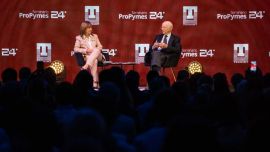Amid an economic crisis aggravated by the Covid-19 pandemic and a scant supply of hard currency, Argentina is looking for new markets for its products in a world sunk in recession. The goal: to raise annual exports from US$65 to US$100 billion.
New products and new markets are the aim, International Relations Secretary Jorge Neme, the Foreign Ministry official responsible for the initiative, told AFP in an interview.
"We do not have any single source [of sales]. Even if we stand out for beef and soy, we have a diverse shopping-basket of exportable products. We’re among the world’s top five pear producers and in the top 10 for apples and wine, to say nothing of being the world’s leading lemon exporter," he listed.
But he also points out the country’s major capacity in biotech, animal and plant genetics, agricultural machinery, pharmaceuticals and medical equipment, the auto industry, audio-visual services and even sport.
"We’re working on all those products," he assured.
Restructuring some US$66 billion worth of debt under foreign legislation and a further US$41 billion under local legislation completed a fortnight ago is a substantial relief for the centre-left government of Alberto Fernández. But the horizon is not yet clear as Gross Domestic Product is estimated to shrink 9.9 percent this year with poverty topping 40 percent and double-digit unemployment on the rise.
As from last year Argentina has imposed capital controls which have been stiffened to a monthly US$200 as the maximum purchase. And although international reserves have been maintained at around US$42 billion, analysts calculate that the net available reserves, including gold, are around US$ seven billion.
The government is pushing the diversification of markets and exportable products to try and improve Argentina’s balance of payments with annual exports of US$100 billion the target, announced Foreign Minister Felipe Solá.
New and old markets
Argentina exported US$32.29 billion in the first seven months of this year, representing a fall of 11.9 percent as against the same period in 2019. China was the only country to increase its purchases in that period (by 13.1 percent to US$3.4 billion) as well as the only country not to undergo economic shrinkage.
"Argentina’s leading market is Mercosur [Brazil, Paraguay and Uruguay]. We have a historic relationship with the United States, a longstanding relationship with the European Union and in the last 20 years we have incorporated a strong relationship with China," highlighted Neme.
But "we have to go where we are not currently. The other places move by themselves, there Argentine businessmen already have contacts and presence," he pointed out, thus stressing the potential of trade with Russia, Mexico, Central America, Central Asia, India, Africa and the Arab countries.
Regarding the free-trade agreement between Mercosur and the EU, signed last year but pending parliamentary ratification and finding various European countries reticent, Neme opined: "It’s neither heaven nor hell. It’s just another agreement. It makes some concessions which could affect sensitive sectors of the de la Argentine economy and also contains some things which would permit us to introduce a bunch of goods to the European market. We do not oppose it, we want it to proceed to Congress to be discussed and evaluated there as to whether it convenient for the country or not."
by Nina Negrón, AFP




















Comments